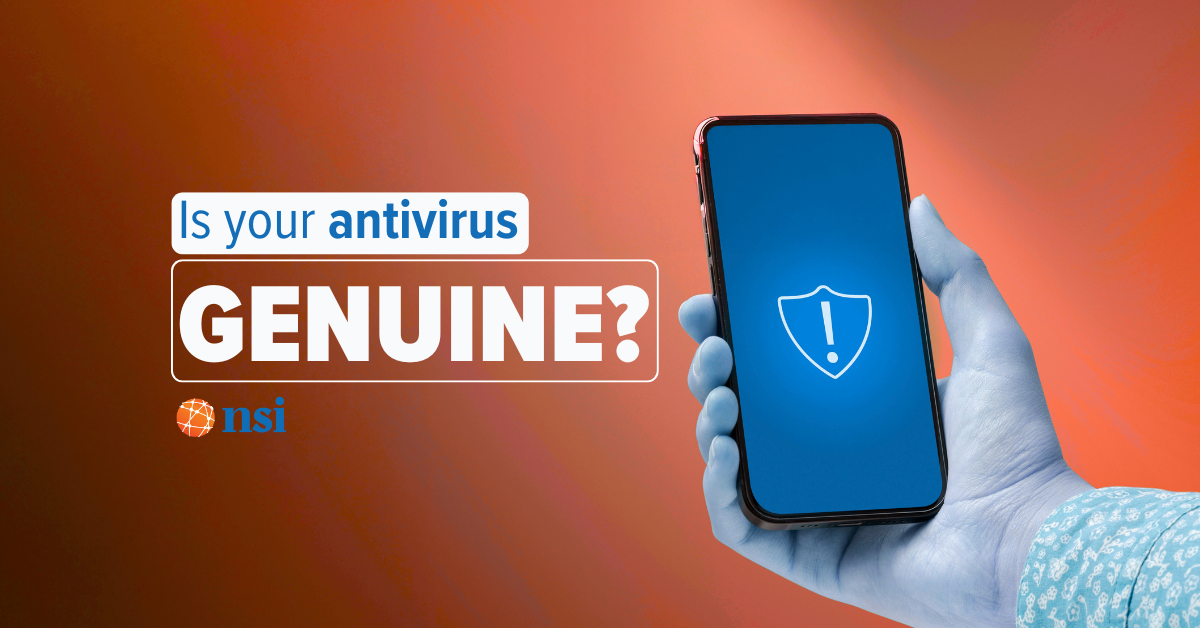Key Takeaways
- Fake antivirus sites are on the rise, and they often mimic well-known brands perfectly.
- Clicking “Download” can install hidden malware like Remote Access Trojans (RATs).
- Attackers aim to steal business credentials, financial data, and customer information.
- The fallout is costly—data breaches, downtime, and reputation damage.
- Preventive habits and a trusted IT partner like NSI are your best defense.
As a business leader, you invest in tools to safeguard your operations. But what if the security software you download turns out to be the threat?
At NSI, we’ve seen how cybercriminals exploit that trust. They build fake antivirus websites so realistic that even experienced professionals can be fooled—then use them to deliver malware straight into company systems.
This is happening more often, and the consequences are severe.
How the Scam Works
Cybercriminals are using polished fake websites that mirror legitimate antivirus brands down to the logo, color palette, and layout.
The site includes a familiar Download button, but clicking it triggers a file—often named something generic, such as StoreInstaller.exe.
Inside is VenomRAT, a type of Remote Access Trojan that secretly gives attackers complete control of your computer. Once inside your network, they can:
- Capture keystrokes and passwords
- Access confidential files and business systems
- Turn on webcams and microphones silently.
- Install more malware and open hidden backdoors.
Their real goal? To steal valuable business data and financial credentials—including banking logins, corporate accounts, and even cryptocurrency wallets.
Why This Threat Is Growing
Fake antivirus sites aren’t the only trick. Cybercriminals have also impersonated:
- Banks and credit providers
- IT service vendors and software companies
Many of these sites are hosted on trusted cloud platforms, such as Amazon Web Services, which lends them an added sense of legitimacy.
To busy professionals, they look genuine, and that’s precisely the point.
The Business Impact
Falling for one of these scams can create lasting damage:
- Data breaches that expose confidential company information
- Financial loss from stolen funds or fraudulent transactions
- Operational disruption as systems are taken offline for cleanup
- Reputation damage if customer data is compromised
The cost of recovery—both financial and reputational—is often far higher than the cost of prevention.
How NSI Helps Protect You
At NSI, we understand that cybersecurity is not just about technology—it’s about trust and vigilance. That’s why we:
- Validate software sources and downloads for our clients
- Monitor your systems for suspicious behavior 24/7
- Respond quickly to isolate and remove threats
- Train your staff to recognize and report suspicious activity
When something looks off, we’re your safety net. We give your team the confidence to move fast—without compromising on risk.
What You Can Do Right Now
- Verify every website URL before downloading software
- Never click download links from emails or messages—go directly to the provider’s site
- Reach out to NSI if something feels suspicious—we’ll verify it for you
- Schedule a security audit to ensure your systems are locked down
Conclusion: Stay Ahead of the Threat
Cybercriminals rely on professionals being distracted, busy, or just trying to do the right thing. Don’t give them that chance.
A few minutes of caution today can save you from weeks of disruption, lost revenue, and reputational damage.
Let NSI be your shield. Call us today or schedule a consultation to secure your business before the next fake download strikes.
FAQs
How can I determine if an antivirus website is legitimate?
Look for subtle URL errors, missing security certificates, or inconsistencies in branding. If unsure, contact NSI, we’ll check for you.
What should I do if I think I downloaded a fake antivirus tool?
Disconnect from the internet immediately and contact NSI. We can isolate and remove the malware and secure your systems.
Are fake sites only targeting antivirus software?
No. Cybercriminals also fake bank, payment, and IT service websites. Always verify the source before entering credentials or downloading software.
